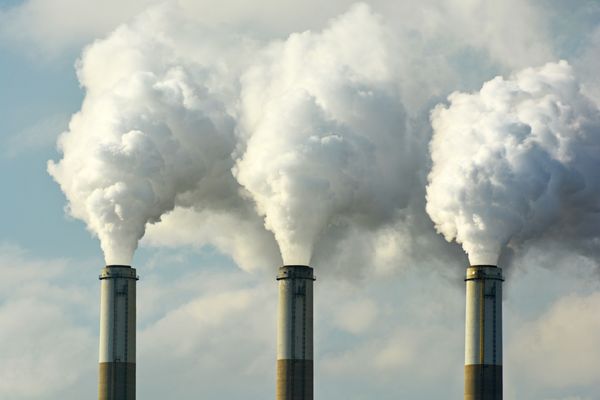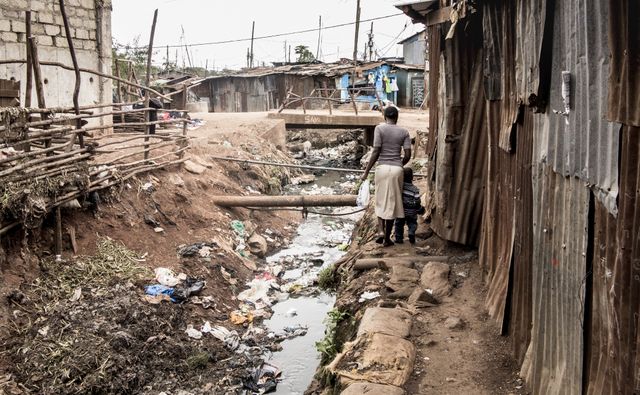4.3.2
Global Shift for Developing Nations 2
The Impact of Environmental Degradation on Health
The Impact of Environmental Degradation on Health
The major environmental problems in the developing world (caused by the global shift) have an impact on people’s health and wellbeing.


Air and water pollution
Air and water pollution
- Some communities in the developing world have suffered from air and water pollution because of the global shift.
- In Beijing in 2013, the air pollution levels at the time were more than 20 times higher than the World Health Organisation levels over a 24 hour period.
- In 2018, Mumbai was ranked the 4th most polluted megacity in the world.


Air and water pollution cont.
Air and water pollution cont.
- Air pollution can cause asthma and have other negative effects on people's health.
- Some people predict that the pollution in Northern China is so bad that it cuts three years from the life expectancy.
- China also has serious water pollution problems. In 2015, 85% of the water in Shanghai's major rivers was undrinkable.


Unplanned settlements
Unplanned settlements
- Unplanned settlements (e.g. slums or favelas in Latin America) often have terrible health conditions.
- There may be no running water, sanitation system and hygiene are often very poor.


Working conditions
Working conditions
- Sometimes the working conditions can be damaging to people’s health. In 2011, Chinese workers at Foxconn were made ill as they were exposed to chemicals used when making iPhones for Apple.
The Impact of Environmental Degradation on Health (Cont.)
The Impact of Environmental Degradation on Health (Cont.)
The major environmental problems in the developing world (caused by the global shift) have an impact on people’s health and wellbeing.


Land degradation
Land degradation
- Some communities in the developing world have suffered land degradation because of the global shift.
- It was predicted in 2014 that 40% of China’s farmland was degraded because of pollution and increased building.
- This means that the quality of the land has reduced. Perhaps it was once fertile farming land that has now been so polluted that it is infertile.


Resource exploitation
Resource exploitation
- Some communities in the developing world have suffered from the over-exploitation of resources because of the global shift.
- The over-exploitation of resources is unsustainable - it means that the resources are being used now but will not be around for future generations to use.
- As China has experienced rapid economic growth, it has become a major consumer of oil, gas, coal, metal, timber - all of which have to be extracted from the earth - causing environmental damage.


Loss of biodiversity
Loss of biodiversity
- Some communities in the developing world have suffered from a loss of biodiversity because of the global shift.
- As deforestation and pollution happen with the growth of manufacturing, the number of plant and animal species in the area drops.
- Since 1990, Togo has lost 60% of its forested area, and Nigeria has lost 50%.
- In 2015, the WWF found that China had lost 50% of its vertebrates since 1970.
Positive Impact of Global Shift - Developing Nations
Positive Impact of Global Shift - Developing Nations
There have been many positive effects of global shift for developing nations.


Infrastructure
Infrastructure
- In the developing world, the global shift has resulted in infrastructure investment.
- By 2016, China had 22,000km of high-speed rail network - about 60% of the world’s total. This has helped China to export enormously. This infrastructure has been built in the manufacturing areas and this benefits the whole population.
- In India, the international airport of Mumbai has become the main hub for the city. It has increased its capacity to handle up to 40 million passengers annually.


Employment and wages
Employment and wages
- In the developing world, the global shift has resulted in waged work for the local population - they are being paid a set amount.
- Whereas previously, many people worked as subsistence farmers or low-paid farmers, the global shift has bought an increase in work with a set wage.
- The increase in waged work has seen 1 billion people come out of ‘absolute poverty’ (less than $1.25 a day) since 1990.
- In the developing world, the global shift has caused poverty reduction.


Education and training
Education and training
- This increase in waged work has reduced poverty because people are paid more.
- In the developing world, the global shift has caused an increase in education and training for the local population.
- The local population has gained new skills and education with the investment from TNCs.
- As Governments have more income to spend on education, the quality has improved. This is particularly true in many Asian countries.
1Tectonic Processes & Hazards
1.1Tectonic Processes & Hazards
1.2Natural Disasters
1.3Natural Disaster Case Studies
1.4Trends & Patterns
2Option 2A: Glaciated Landscapes & Change
2.1Glaciated Landscapes Over Time
2.2Periglacial Landscapes
2.3Glacial Processes
2.4Glacial Landforms
3Option 2B: Coastal Landscapes & Change
3.1Coastal Landscapes
3.2Coastal Erosion & Deposition
3.3Coastal Risks
4Globalisation
4.1Globalisation
4.2Negatives of Globalisation
4.3Global Shift
4.5Culture
4.6Measuring Development
5Option 4A: Regenerating Places
5.1Types of Economies
5.2Function of Places
5.3Regeneration
5.4Regeneration Case Studies
6Option 4B: Diverse Places
6.1Population Structure
6.2Past & Present Connections
6.3Urban & Rural Spaces
6.4Diversity
6.5Urban & Rural Case Studies
6.6Case Study - Tower Hamlets
6.7Case Study - Sturton-le-Steeple
7The Water Cycle & Water Insecurity (A2 only)
7.1Hydrological Processes Global to Local
7.2Influences on the Water Cycle
7.3Water Insecurity
8The Carbon Cycle & Energy Security (A2 only)
8.1The Carbon Cycle
8.2Energy Consumption
8.3Alternative Energy
8.4Growing Demand for Resources
9Superpowers (A2 only)
9.1Superpowers
9.2Hard & Soft Power
9.2.1Hard & Soft Power
9.2.2Emerging Powers - China Rivalry
9.2.3Emerging Powers - Chinese Sources of Power
9.2.4Emerging Powers - Brazil
9.2.5Emerging Powers - Russia
9.2.6Emerging Powers - India
9.2.7Theories of Development
9.2.8Power Case Studies: Chinese One Belt One Road
9.2.9Power Case Studies: Pakistan Nuclear Arms
9.2.10Power Case Studies: OPEC
9.3IGOs, TNCs & Alliances
10Option 8A: Health & Human Rights (A2 only)
10.1Human Development
10.2Role of Governments & IGOs
10.3Human Rights
10.4Interventions
11Option 8B: Migration & Identity (A2 only)
11.1Globalisation & Migration
11.2Consequences of Migration
11.3Nation States
11.4Responses to Global Migration
Jump to other topics
1Tectonic Processes & Hazards
1.1Tectonic Processes & Hazards
1.2Natural Disasters
1.3Natural Disaster Case Studies
1.4Trends & Patterns
2Option 2A: Glaciated Landscapes & Change
2.1Glaciated Landscapes Over Time
2.2Periglacial Landscapes
2.3Glacial Processes
2.4Glacial Landforms
3Option 2B: Coastal Landscapes & Change
3.1Coastal Landscapes
3.2Coastal Erosion & Deposition
3.3Coastal Risks
4Globalisation
4.1Globalisation
4.2Negatives of Globalisation
4.3Global Shift
4.5Culture
4.6Measuring Development
5Option 4A: Regenerating Places
5.1Types of Economies
5.2Function of Places
5.3Regeneration
5.4Regeneration Case Studies
6Option 4B: Diverse Places
6.1Population Structure
6.2Past & Present Connections
6.3Urban & Rural Spaces
6.4Diversity
6.5Urban & Rural Case Studies
6.6Case Study - Tower Hamlets
6.7Case Study - Sturton-le-Steeple
7The Water Cycle & Water Insecurity (A2 only)
7.1Hydrological Processes Global to Local
7.2Influences on the Water Cycle
7.3Water Insecurity
8The Carbon Cycle & Energy Security (A2 only)
8.1The Carbon Cycle
8.2Energy Consumption
8.3Alternative Energy
8.4Growing Demand for Resources
9Superpowers (A2 only)
9.1Superpowers
9.2Hard & Soft Power
9.2.1Hard & Soft Power
9.2.2Emerging Powers - China Rivalry
9.2.3Emerging Powers - Chinese Sources of Power
9.2.4Emerging Powers - Brazil
9.2.5Emerging Powers - Russia
9.2.6Emerging Powers - India
9.2.7Theories of Development
9.2.8Power Case Studies: Chinese One Belt One Road
9.2.9Power Case Studies: Pakistan Nuclear Arms
9.2.10Power Case Studies: OPEC
9.3IGOs, TNCs & Alliances
10Option 8A: Health & Human Rights (A2 only)
10.1Human Development
10.2Role of Governments & IGOs
10.3Human Rights
10.4Interventions
11Option 8B: Migration & Identity (A2 only)
11.1Globalisation & Migration
11.2Consequences of Migration
11.3Nation States
11.4Responses to Global Migration
Unlock your full potential with Seneca Premium
Unlimited access to 10,000+ open-ended exam questions
Mini-mock exams based on your study history
Unlock 800+ premium courses & e-books